Katy Huth Jones's Blog, page 24
June 23, 2014
The Little Book That Could
 From Watty Piper's 1930 classic The Little Engine That CouldSometime around 1990 my writer friend and fellow bibliophile gave me a copy of Pauline Baynes' Good King Wenceslas. This simple picture book fired up my imagination, and I wanted to know MORE about this young man, since there was obviously a great story beyond the scene portrayed in the Christmas carol.
From Watty Piper's 1930 classic The Little Engine That CouldSometime around 1990 my writer friend and fellow bibliophile gave me a copy of Pauline Baynes' Good King Wenceslas. This simple picture book fired up my imagination, and I wanted to know MORE about this young man, since there was obviously a great story beyond the scene portrayed in the Christmas carol.
I did a lot of old-fashioned research, reading everything I could find about Wenceslas. I found a copy of a rare book through interlibrary loan--a "Life of Saint Wenceslas" published in 1929, the thousand year anniversary of his death. I discovered this 10th century ruler had been a duke, not a king, and his Czech name was Vaclav. I decided to write his story through the eyes of a servant boy.
 Another great NF source
Another great NF sourceI first submitted a summary and sample chapters to an agent I met at a writer's conference.

The manuscript won first place in our local writer's guild contest.
 I received a lot of good feedback from editors, but no one wanted to publish it. Since I'd immersed the reader in the raw, gritty tenth century where human sacrifice and slavery and all kinds of yucky stuff was going on, it was either too raw or too Christian.
I received a lot of good feedback from editors, but no one wanted to publish it. Since I'd immersed the reader in the raw, gritty tenth century where human sacrifice and slavery and all kinds of yucky stuff was going on, it was either too raw or too Christian. Editor critique at SCBWI conference, later rejected
Editor critique at SCBWI conference, later rejectedEerdman's wanted to publish it, and held it for about three years, but they finally went with a "safer" picture book version that merely illustrated the Christmas carol. My manuscript must have influenced the artist, though, because it's the only one featuring a young "Good King" Wenceslas.
 Then I was distracted by cancer and working on
Leandra's Enchanted Flute
while poetry gushed from me in every possible form, so I didn't do much with the manuscript for almost ten years.
Then I was distracted by cancer and working on
Leandra's Enchanted Flute
while poetry gushed from me in every possible form, so I didn't do much with the manuscript for almost ten years.Then my energetic writer friend, Sally learned that Pauline Books & Media was publishing fiction, and I sent a query. They had actually rejected this story in 1994, but I'd always thought they would be the best publisher because Wenceslas is the patron saint of the Czech Republic.
Pauline asked to see the whole manuscript, and a few weeks later asked if I could make Poidevin a little older when the story began (he was originally eight years old) so they could fit it in their YA catalog. The oldest I felt I could make him was twelve, since Wenceslas/Vaclav was fourteen, and they liked it and sent a rather intimidating marketing survey for me to fill out.
That worried me a little since I still haven't learned the secret to successful marketing, but I ran it by my critique group, and they said it looked great and gave me some more ideas. I didn't hear back for a few more weeks so began to worry they weren't going to publish it after all, but the office manager sent an eleven page contract, and a follow up email from the YA editor I'll be working with gave a tentative publishing date of January 1, 2016.
All of that was pretty exciting, but it was even more exciting when I received a thick packet of information and a "Welcome to Pauline Books & Media." I think I better understand Sally Field's Oscar gush, "You like me! Right now you like me!"
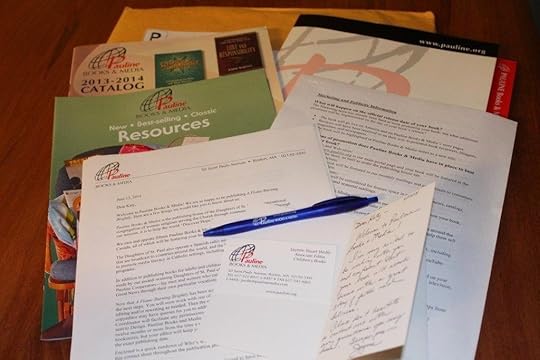 Years between first submission and acceptance: 22
Years between first submission and acceptance: 22Rejections received: 14
Stay tuned for more updates as this publishing process progresses! (Alliteration intentional....)
Published on June 23, 2014 08:24
June 16, 2014
The Good Thing About Rejection
A recent comment by a new writer acquaintance made me realize that receiving rejection slips is not the same as it used to be. Indie writers who self-publish without first trying to navigate the publishing jungle as well as new writers who are dealing with editors and agents and their "if you don't hear back from us in xx weeks, consider yourself rejected" policy do not share a common experience with me and other older writers. (Eek, I said it--I am one of the "older writers" now.)
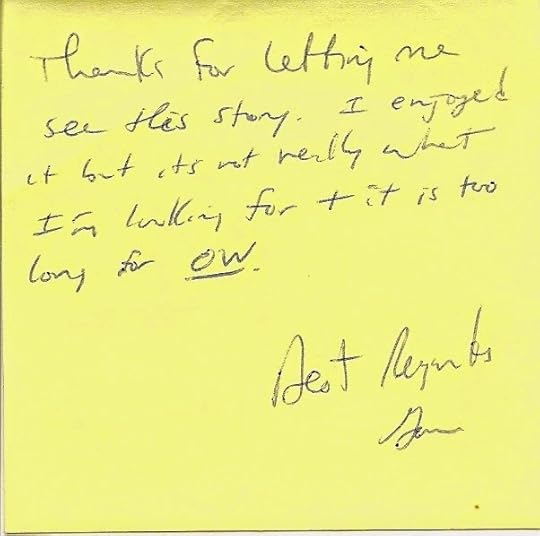 My 1st reject--on a yellow sticky note from 1985Even though I'd written short stories and poetry since third grade, I didn't begin to write seriously for publication until 1985. I was prolific then, churning out fantasy and science fiction stories as well as a few children's stories as fast as I could write them. I usually let my writer's group read them before sending them out to magazines, but sometimes I was premature in my excitement.
My 1st reject--on a yellow sticky note from 1985Even though I'd written short stories and poetry since third grade, I didn't begin to write seriously for publication until 1985. I was prolific then, churning out fantasy and science fiction stories as well as a few children's stories as fast as I could write them. I usually let my writer's group read them before sending them out to magazines, but sometimes I was premature in my excitement.
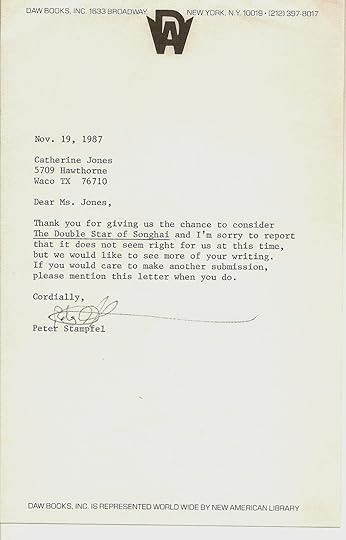 1st reject for my 1st novelWhile I was writing dozens and dozens of short stories, I also began researching and writing my first novel, which was (thankfully) never published. Most of my rejects for that one were form letters, but the first rejection was a personally typed letter. Those types of rejections are always encouraging, because busy editors will NOT take the time to give you feedback unless they believe you have some hope of developing into a better and publishable writer.
1st reject for my 1st novelWhile I was writing dozens and dozens of short stories, I also began researching and writing my first novel, which was (thankfully) never published. Most of my rejects for that one were form letters, but the first rejection was a personally typed letter. Those types of rejections are always encouraging, because busy editors will NOT take the time to give you feedback unless they believe you have some hope of developing into a better and publishable writer.
 Over the years I sent multiple stories to the same encouraging editors, hoping one of the stories would "connect." But alas, it took me over 600 rejections (yes, you read that correctly) and 7 years of writing, writing, writing and improving my craft to finally receive an acceptance.
Over the years I sent multiple stories to the same encouraging editors, hoping one of the stories would "connect." But alas, it took me over 600 rejections (yes, you read that correctly) and 7 years of writing, writing, writing and improving my craft to finally receive an acceptance.
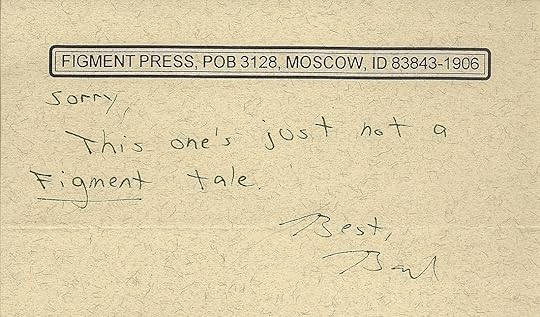 Some editors are brief.
Some editors are brief.
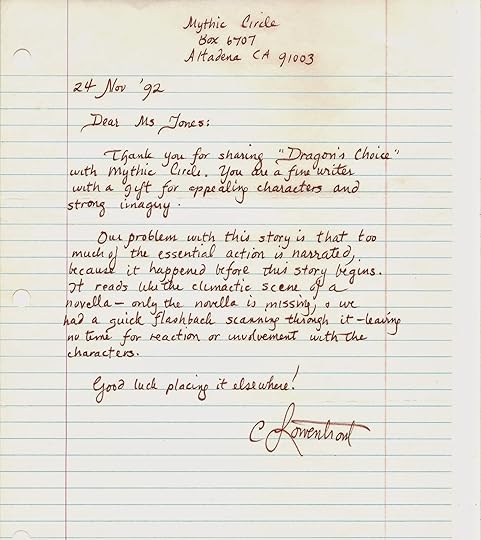 Some have neat handwriting!
Some have neat handwriting!
 This one always wrote real letters! (And did buy one of my fantasy stories.)
This one always wrote real letters! (And did buy one of my fantasy stories.)
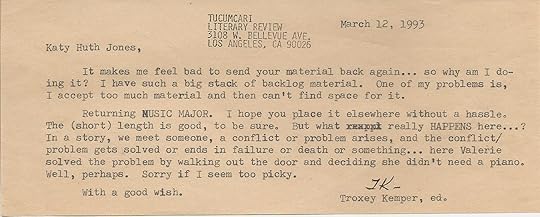 This one had a manual typewriter & really skimped on paper.
This one had a manual typewriter & really skimped on paper.
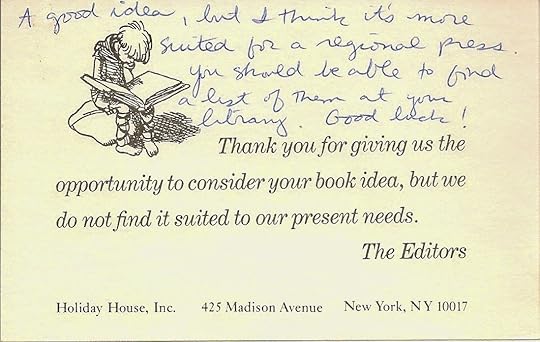 Form postcard with added note.
Form postcard with added note.
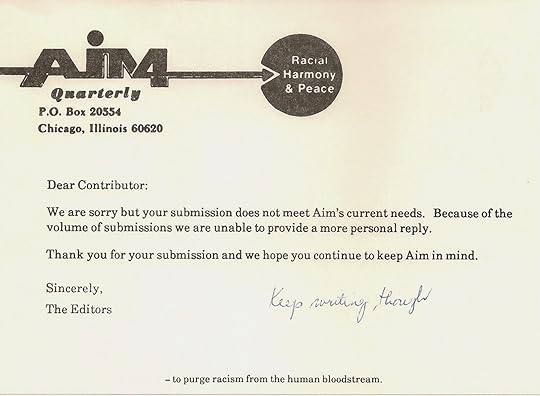 Form letter with brief encouraging note.
Form letter with brief encouraging note.
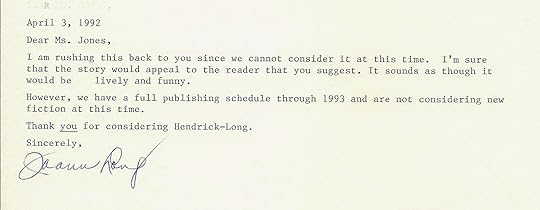 Sometimes the reason has nothing to do with the writing.
Sometimes the reason has nothing to do with the writing.
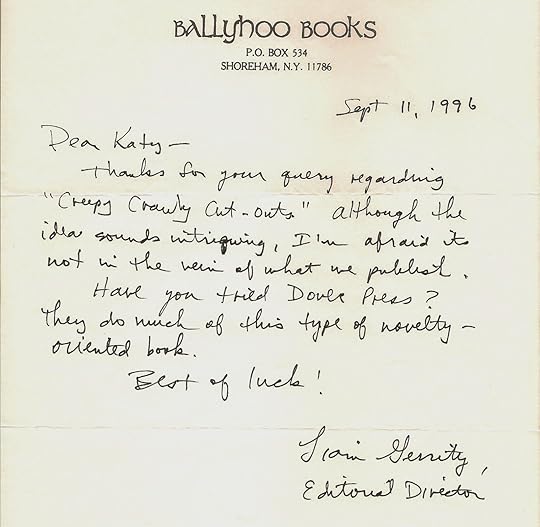 Sometimes they'll suggest other publishing houses.I now have over 1,000 rejections crammed in an overfull folder (which I used to take to school author visits to show students the "reality" of publishing, but I may have to rethink that). The majority of them are "form letters" with no feedback.
Sometimes they'll suggest other publishing houses.I now have over 1,000 rejections crammed in an overfull folder (which I used to take to school author visits to show students the "reality" of publishing, but I may have to rethink that). The majority of them are "form letters" with no feedback.
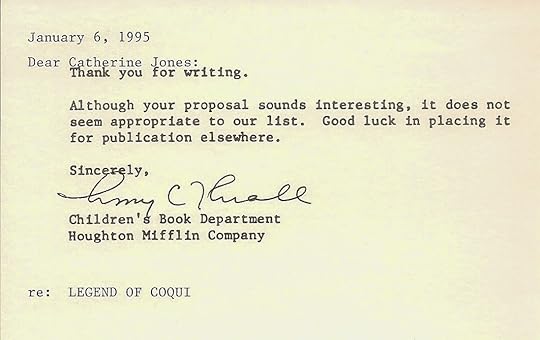 Some form rejects are sort of "personalized"...
Some form rejects are sort of "personalized"...
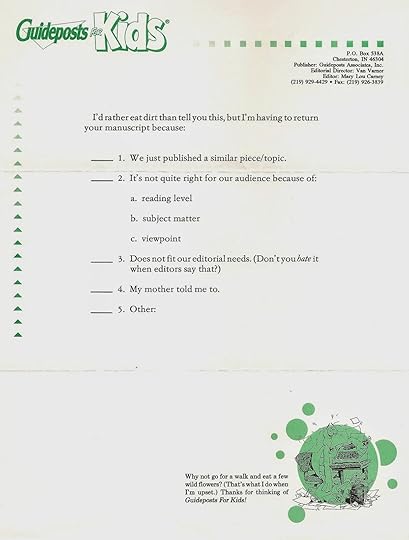 And others not--just stuffed in a SASE.But those several editors who took just a few minutes to share positive feedback with a young and clueless writer encouraged me to keep writing, keep polishing, keep improving, and NOT give up submitting until I found the right editor/magazine/publisher for each publishable project. I now view my seven year journey to publication as my apprenticeship; in a way, these wonderful editors "mentored" me.
And others not--just stuffed in a SASE.But those several editors who took just a few minutes to share positive feedback with a young and clueless writer encouraged me to keep writing, keep polishing, keep improving, and NOT give up submitting until I found the right editor/magazine/publisher for each publishable project. I now view my seven year journey to publication as my apprenticeship; in a way, these wonderful editors "mentored" me.
For all the acceptances I've had over the last 22 years, there are many more submissions that were never accepted: Some because they weren't good enough to merit publication, but others simply because of bad luck or timing. After all, good ideas happen simultaneously to more than one writer, and whoever "gets there first" is the one published.
And sometimes a well-written project just has to wait until the right time--but that's a subject for another blog. (Anyway, I'd rather wait until I have the signed contract returned and the advance check in hand before I write about that book's long journey. Stay tuned!)
 My 1st reject--on a yellow sticky note from 1985Even though I'd written short stories and poetry since third grade, I didn't begin to write seriously for publication until 1985. I was prolific then, churning out fantasy and science fiction stories as well as a few children's stories as fast as I could write them. I usually let my writer's group read them before sending them out to magazines, but sometimes I was premature in my excitement.
My 1st reject--on a yellow sticky note from 1985Even though I'd written short stories and poetry since third grade, I didn't begin to write seriously for publication until 1985. I was prolific then, churning out fantasy and science fiction stories as well as a few children's stories as fast as I could write them. I usually let my writer's group read them before sending them out to magazines, but sometimes I was premature in my excitement. 1st reject for my 1st novelWhile I was writing dozens and dozens of short stories, I also began researching and writing my first novel, which was (thankfully) never published. Most of my rejects for that one were form letters, but the first rejection was a personally typed letter. Those types of rejections are always encouraging, because busy editors will NOT take the time to give you feedback unless they believe you have some hope of developing into a better and publishable writer.
1st reject for my 1st novelWhile I was writing dozens and dozens of short stories, I also began researching and writing my first novel, which was (thankfully) never published. Most of my rejects for that one were form letters, but the first rejection was a personally typed letter. Those types of rejections are always encouraging, because busy editors will NOT take the time to give you feedback unless they believe you have some hope of developing into a better and publishable writer. Over the years I sent multiple stories to the same encouraging editors, hoping one of the stories would "connect." But alas, it took me over 600 rejections (yes, you read that correctly) and 7 years of writing, writing, writing and improving my craft to finally receive an acceptance.
Over the years I sent multiple stories to the same encouraging editors, hoping one of the stories would "connect." But alas, it took me over 600 rejections (yes, you read that correctly) and 7 years of writing, writing, writing and improving my craft to finally receive an acceptance. Some editors are brief.
Some editors are brief.
 Some have neat handwriting!
Some have neat handwriting!
 This one always wrote real letters! (And did buy one of my fantasy stories.)
This one always wrote real letters! (And did buy one of my fantasy stories.)
 This one had a manual typewriter & really skimped on paper.
This one had a manual typewriter & really skimped on paper.
 Form postcard with added note.
Form postcard with added note.
 Form letter with brief encouraging note.
Form letter with brief encouraging note.
 Sometimes the reason has nothing to do with the writing.
Sometimes the reason has nothing to do with the writing.
 Sometimes they'll suggest other publishing houses.I now have over 1,000 rejections crammed in an overfull folder (which I used to take to school author visits to show students the "reality" of publishing, but I may have to rethink that). The majority of them are "form letters" with no feedback.
Sometimes they'll suggest other publishing houses.I now have over 1,000 rejections crammed in an overfull folder (which I used to take to school author visits to show students the "reality" of publishing, but I may have to rethink that). The majority of them are "form letters" with no feedback. Some form rejects are sort of "personalized"...
Some form rejects are sort of "personalized"...
 And others not--just stuffed in a SASE.But those several editors who took just a few minutes to share positive feedback with a young and clueless writer encouraged me to keep writing, keep polishing, keep improving, and NOT give up submitting until I found the right editor/magazine/publisher for each publishable project. I now view my seven year journey to publication as my apprenticeship; in a way, these wonderful editors "mentored" me.
And others not--just stuffed in a SASE.But those several editors who took just a few minutes to share positive feedback with a young and clueless writer encouraged me to keep writing, keep polishing, keep improving, and NOT give up submitting until I found the right editor/magazine/publisher for each publishable project. I now view my seven year journey to publication as my apprenticeship; in a way, these wonderful editors "mentored" me.For all the acceptances I've had over the last 22 years, there are many more submissions that were never accepted: Some because they weren't good enough to merit publication, but others simply because of bad luck or timing. After all, good ideas happen simultaneously to more than one writer, and whoever "gets there first" is the one published.
And sometimes a well-written project just has to wait until the right time--but that's a subject for another blog. (Anyway, I'd rather wait until I have the signed contract returned and the advance check in hand before I write about that book's long journey. Stay tuned!)
Published on June 16, 2014 13:11
June 11, 2014
Missing my Dad on Father's Day
This will be the third Father's Day since my Dad died. While looking for a card for my father-in-law, it hit me forcibly that I can't ever give my Dad another funny card. So I thought I'd share this photojournal of the remarkable journey of a remarkable man.
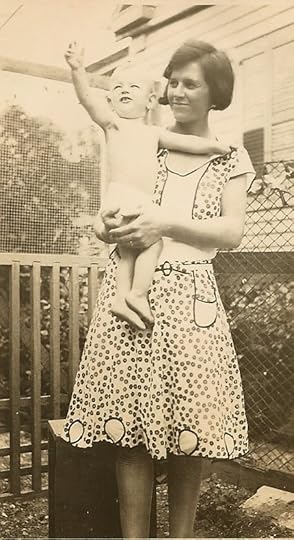 My father, Walter Harvey Huth, grew up in a German-speaking family, the son of immigrants to Texas who settled in a small farming community southeast of San Antonio called Lenz. In the 1930's Lenz had a community hall, a store, a mill, and a two-room schoolhouse where church services were held in German by a visiting pastor. Dad remembers the men sitting on one side and the women and children on the other side.
My father, Walter Harvey Huth, grew up in a German-speaking family, the son of immigrants to Texas who settled in a small farming community southeast of San Antonio called Lenz. In the 1930's Lenz had a community hall, a store, a mill, and a two-room schoolhouse where church services were held in German by a visiting pastor. Dad remembers the men sitting on one side and the women and children on the other side.


 Because each of his parents had ten siblings, Dad had many cousins, several of whom lived nearby. He also knew all four grandparents as a young boy.
Because each of his parents had ten siblings, Dad had many cousins, several of whom lived nearby. He also knew all four grandparents as a young boy.
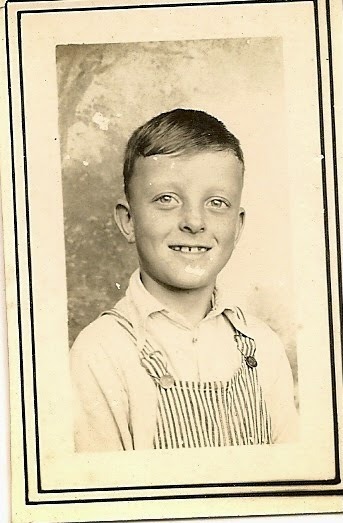 Possibly because his parents weren't able to go far in their education (his Dad 8th grade; his Mom 6th grade), they encouraged both their sons to eventually earn college degrees. At first my Dad wasn't an enthusiastic student; he preferred hunting and fishing after chores were done, not studying like his older brother did.
Possibly because his parents weren't able to go far in their education (his Dad 8th grade; his Mom 6th grade), they encouraged both their sons to eventually earn college degrees. At first my Dad wasn't an enthusiastic student; he preferred hunting and fishing after chores were done, not studying like his older brother did.

 My Dad made a great Boy Scout.
My Dad made a great Boy Scout.
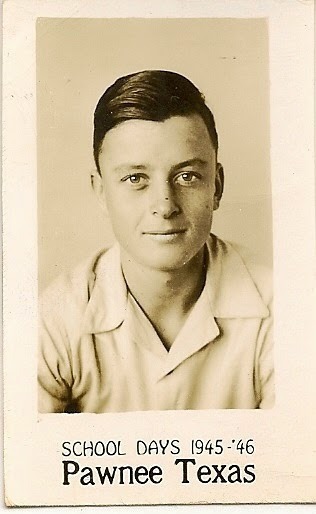 My Dad was very athletic, playing football, basketball, and baseball. He and his buddy Alvin Greaves were known as the "Lenz Flashes" once they got to high school because they could run so fast.
My Dad was very athletic, playing football, basketball, and baseball. He and his buddy Alvin Greaves were known as the "Lenz Flashes" once they got to high school because they could run so fast.


 Dad graduated from Kennedy High School in 1948 when he was only 16 (he turned 17 on August 29) and went to Texas A&M the first year. His grandpa Mueller was an Aggie, but I don't know if that influenced his choice of schools. He transferred to UT Arlington his sophomore year. Several years ago he told me he was "too young" to go to college because he hung out with older boys and got in "a lot of trouble."
Dad graduated from Kennedy High School in 1948 when he was only 16 (he turned 17 on August 29) and went to Texas A&M the first year. His grandpa Mueller was an Aggie, but I don't know if that influenced his choice of schools. He transferred to UT Arlington his sophomore year. Several years ago he told me he was "too young" to go to college because he hung out with older boys and got in "a lot of trouble."
 Dad joined the Army in 1951 and because he had some college went to Officers Candidate School (OCS).
Dad joined the Army in 1951 and because he had some college went to Officers Candidate School (OCS).
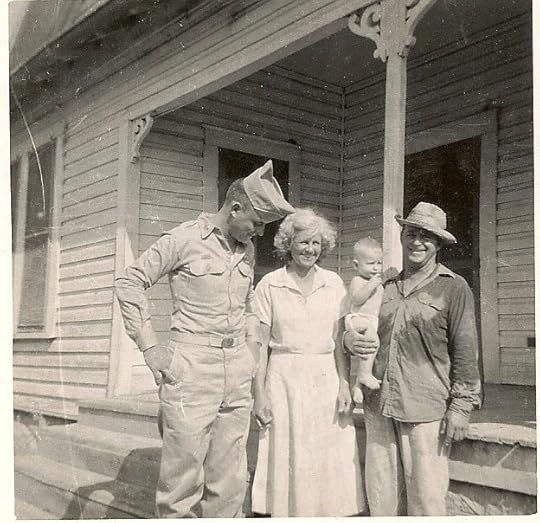 Visiting his parents and nephew after boot camp.
Visiting his parents and nephew after boot camp.


 Freezing in Korea--he trained spies as an expendable 2nd Lt.
Freezing in Korea--he trained spies as an expendable 2nd Lt.
 Still managed to hunt in Montana on leave.
Still managed to hunt in Montana on leave.
 Dating my Mom in Washington D.C.
Dating my Mom in Washington D.C.
 While on TDY (temporary duty) as a German translator with the CIA, he met my Mom, who also worked for the CIA. Their meeting and courting would make a great romance novel, since they were part of the Berlin Wall project at the time. I hope to write that story someday.
While on TDY (temporary duty) as a German translator with the CIA, he met my Mom, who also worked for the CIA. Their meeting and courting would make a great romance novel, since they were part of the Berlin Wall project at the time. I hope to write that story someday.
 Their wedding December 6, 1956
Their wedding December 6, 1956
 Expecting their first child--me!
Expecting their first child--me!
 Me & Mom meeting Dad's folks for the first time
Me & Mom meeting Dad's folks for the first time
 Pilot training, Camp Gary, Texas.
Pilot training, Camp Gary, Texas.
 Stationed in Hawaii 1962-1965
Stationed in Hawaii 1962-1965
 Chopper pilot in Vietnam 1966-67
Chopper pilot in Vietnam 1966-67
 With his 3 girls
With his 3 girls
 The consummate fisherman.
The consummate fisherman.
After retiring from the Army in 1971, Dad worked mostly in landscaping but also as a German translator. He and my Mom opened an arts and crafts store which made money every year, and they sold it at a profit, allowing them to retire early and travel to all 50 states, most of Canada, and to Europe.
Once Dad got too sick to travel, he and my Mom realized how lucky they'd been. After all, he'd survived two wars, and most of their investments had made money, giving them time and opportunity to do what they enjoyed for several years.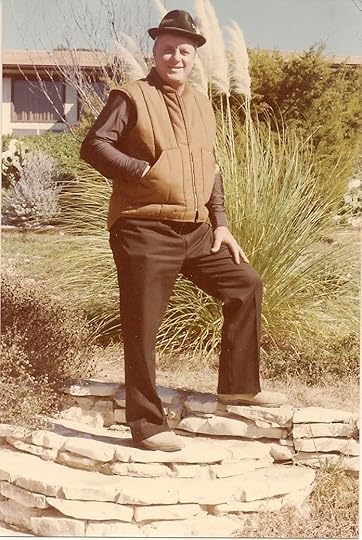


 My Mom's surprise 70th birthday party.
My Mom's surprise 70th birthday party.
 With his 3 girls at their 50th wedding anniversary.My Dad was always my hero, but he was also a kind, generous man, and it still doesn't seem possible that he's no longer with us. I'm thankful he lived as long as he did, against all odds, and that I was blessed to have him as my father.
With his 3 girls at their 50th wedding anniversary.My Dad was always my hero, but he was also a kind, generous man, and it still doesn't seem possible that he's no longer with us. I'm thankful he lived as long as he did, against all odds, and that I was blessed to have him as my father.
 My father, Walter Harvey Huth, grew up in a German-speaking family, the son of immigrants to Texas who settled in a small farming community southeast of San Antonio called Lenz. In the 1930's Lenz had a community hall, a store, a mill, and a two-room schoolhouse where church services were held in German by a visiting pastor. Dad remembers the men sitting on one side and the women and children on the other side.
My father, Walter Harvey Huth, grew up in a German-speaking family, the son of immigrants to Texas who settled in a small farming community southeast of San Antonio called Lenz. In the 1930's Lenz had a community hall, a store, a mill, and a two-room schoolhouse where church services were held in German by a visiting pastor. Dad remembers the men sitting on one side and the women and children on the other side.

 Because each of his parents had ten siblings, Dad had many cousins, several of whom lived nearby. He also knew all four grandparents as a young boy.
Because each of his parents had ten siblings, Dad had many cousins, several of whom lived nearby. He also knew all four grandparents as a young boy. Possibly because his parents weren't able to go far in their education (his Dad 8th grade; his Mom 6th grade), they encouraged both their sons to eventually earn college degrees. At first my Dad wasn't an enthusiastic student; he preferred hunting and fishing after chores were done, not studying like his older brother did.
Possibly because his parents weren't able to go far in their education (his Dad 8th grade; his Mom 6th grade), they encouraged both their sons to eventually earn college degrees. At first my Dad wasn't an enthusiastic student; he preferred hunting and fishing after chores were done, not studying like his older brother did.
 My Dad made a great Boy Scout.
My Dad made a great Boy Scout.
 My Dad was very athletic, playing football, basketball, and baseball. He and his buddy Alvin Greaves were known as the "Lenz Flashes" once they got to high school because they could run so fast.
My Dad was very athletic, playing football, basketball, and baseball. He and his buddy Alvin Greaves were known as the "Lenz Flashes" once they got to high school because they could run so fast.

 Dad graduated from Kennedy High School in 1948 when he was only 16 (he turned 17 on August 29) and went to Texas A&M the first year. His grandpa Mueller was an Aggie, but I don't know if that influenced his choice of schools. He transferred to UT Arlington his sophomore year. Several years ago he told me he was "too young" to go to college because he hung out with older boys and got in "a lot of trouble."
Dad graduated from Kennedy High School in 1948 when he was only 16 (he turned 17 on August 29) and went to Texas A&M the first year. His grandpa Mueller was an Aggie, but I don't know if that influenced his choice of schools. He transferred to UT Arlington his sophomore year. Several years ago he told me he was "too young" to go to college because he hung out with older boys and got in "a lot of trouble." Dad joined the Army in 1951 and because he had some college went to Officers Candidate School (OCS).
Dad joined the Army in 1951 and because he had some college went to Officers Candidate School (OCS). Visiting his parents and nephew after boot camp.
Visiting his parents and nephew after boot camp.


 Freezing in Korea--he trained spies as an expendable 2nd Lt.
Freezing in Korea--he trained spies as an expendable 2nd Lt.
 Still managed to hunt in Montana on leave.
Still managed to hunt in Montana on leave. Dating my Mom in Washington D.C.
Dating my Mom in Washington D.C.
 While on TDY (temporary duty) as a German translator with the CIA, he met my Mom, who also worked for the CIA. Their meeting and courting would make a great romance novel, since they were part of the Berlin Wall project at the time. I hope to write that story someday.
While on TDY (temporary duty) as a German translator with the CIA, he met my Mom, who also worked for the CIA. Their meeting and courting would make a great romance novel, since they were part of the Berlin Wall project at the time. I hope to write that story someday. Their wedding December 6, 1956
Their wedding December 6, 1956
 Expecting their first child--me!
Expecting their first child--me!
 Me & Mom meeting Dad's folks for the first time
Me & Mom meeting Dad's folks for the first time
 Pilot training, Camp Gary, Texas.
Pilot training, Camp Gary, Texas.
 Stationed in Hawaii 1962-1965
Stationed in Hawaii 1962-1965
 Chopper pilot in Vietnam 1966-67
Chopper pilot in Vietnam 1966-67
 With his 3 girls
With his 3 girls
 The consummate fisherman.
The consummate fisherman.After retiring from the Army in 1971, Dad worked mostly in landscaping but also as a German translator. He and my Mom opened an arts and crafts store which made money every year, and they sold it at a profit, allowing them to retire early and travel to all 50 states, most of Canada, and to Europe.
Once Dad got too sick to travel, he and my Mom realized how lucky they'd been. After all, he'd survived two wars, and most of their investments had made money, giving them time and opportunity to do what they enjoyed for several years.



 My Mom's surprise 70th birthday party.
My Mom's surprise 70th birthday party.
 With his 3 girls at their 50th wedding anniversary.My Dad was always my hero, but he was also a kind, generous man, and it still doesn't seem possible that he's no longer with us. I'm thankful he lived as long as he did, against all odds, and that I was blessed to have him as my father.
With his 3 girls at their 50th wedding anniversary.My Dad was always my hero, but he was also a kind, generous man, and it still doesn't seem possible that he's no longer with us. I'm thankful he lived as long as he did, against all odds, and that I was blessed to have him as my father.
Published on June 11, 2014 06:09
June 2, 2014
My Oma Huth
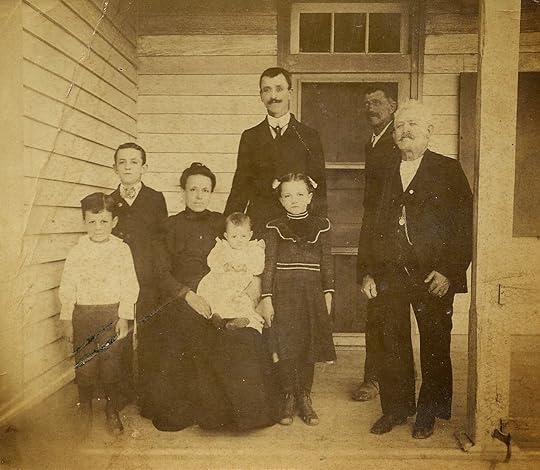 The Mueller family in New Braunfels 1902--Grandma's the babyMy father's mother, Henrietta Mueller Huth, was the daughter of German immigrants to Texas. All of her 78 years were hard ones, and I wish I'd understood that sooner so I could have encouraged her even more than I did.
The Mueller family in New Braunfels 1902--Grandma's the babyMy father's mother, Henrietta Mueller Huth, was the daughter of German immigrants to Texas. All of her 78 years were hard ones, and I wish I'd understood that sooner so I could have encouraged her even more than I did.Grandma grew up in a large family with seven living brothers and one sister, who wasn't part of her life for long because this sister was sent to a mental institution. Grandma became a second mother to her five younger brothers. She only finished the sixth grade.
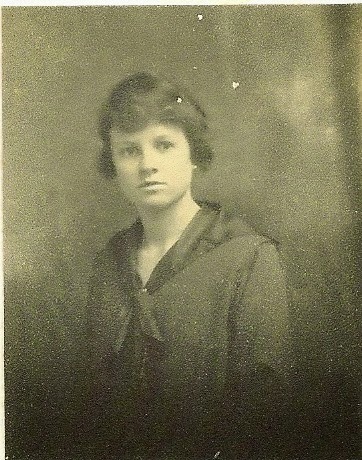 Young Henrietta Mueller When my Grandpa courted her and finally married her when she was 22, she must have dreamed of finally having her own household with at least one or two daughters of her own.
Young Henrietta Mueller When my Grandpa courted her and finally married her when she was 22, she must have dreamed of finally having her own household with at least one or two daughters of her own. The courting couple took many photos together.
The courting couple took many photos together.
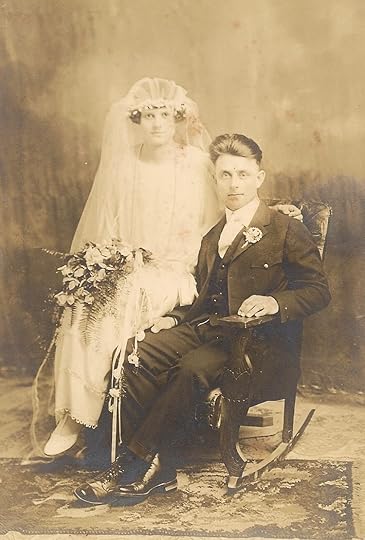 Married 1924Alas, her first child didn't come along for 4 years, and she was only able to have one more (my Dad). Both boys, of course.
Married 1924Alas, her first child didn't come along for 4 years, and she was only able to have one more (my Dad). Both boys, of course.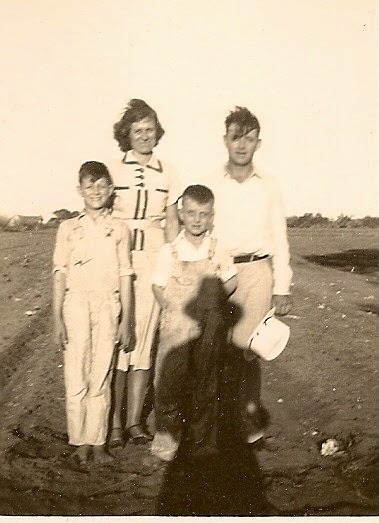 My grandparents, uncle & my Dad c. 1936
My grandparents, uncle & my Dad c. 1936Life on their small farm was constant, back-breaking work. Not only did Grandma do all the cooking for her family, occasional farm workers, and mooching relatives, she washed clothes by hand (using water from a cistern since they didn't have indoor plumbing until the 1960's) and hung them on a clothesline, ironed with those cast iron monstrosities heated on the stovetop, sewed dresses by hand for herself and shirts for her men out of flour sacks, kept hundreds of chickens for eggs, meat, and "egg money," picked cotton, tended a garden, and did it all with a meek and gentle spirit. I never saw her angry or heard her complain. But I did see sadness in her eyes.
 My uncle's wedding 1949; Grandma already white-headed
My uncle's wedding 1949; Grandma already white-headedWhen she knew we were visiting she'd bake for days, filling a table with pies, cobblers, cookies, and her special homemade bread. I remember her hands were so strong and her fingers so long she could hold all her dominoes when she and Grandpa played "42" with my parents.
My hair was long, especially as a teen, and Grandma liked to brush it and "fix" it. While she did this I would ask about her family, and once even wrote down the names and dates she could remember (I still have those notes). Later she gave me photos of her great-grandmother, parents, wedding photos, and her catechism booklet (in German). She must have known I would treasure them.
 Her catechism booklet dated 13 Apr 1919The last two years of her life she spent at a rehab center or cared for at home by Grandpa after she had a debilitating stroke. For one of my last visits I made bread for her as my way of thanking her for all the yummy bread she'd made for us.
Her catechism booklet dated 13 Apr 1919The last two years of her life she spent at a rehab center or cared for at home by Grandpa after she had a debilitating stroke. For one of my last visits I made bread for her as my way of thanking her for all the yummy bread she'd made for us. Only photo I have of her smile--captured in the late 1960sI didn't learn until after she died that she'd dreamed of being a concert pianist. I also didn't understand until later that in the strict German culture in which she lived, the woman's side of the family was not the important one; the man's lineage was more worth remembering. So when I let Grandma know I wanted to remember HER family, it was the best thing I could have done for her. (That and let her play with my hair since she never had the daughter she wanted so badly.)
Only photo I have of her smile--captured in the late 1960sI didn't learn until after she died that she'd dreamed of being a concert pianist. I also didn't understand until later that in the strict German culture in which she lived, the woman's side of the family was not the important one; the man's lineage was more worth remembering. So when I let Grandma know I wanted to remember HER family, it was the best thing I could have done for her. (That and let her play with my hair since she never had the daughter she wanted so badly.)I have a few things in common with my Grandma: I too wanted many children, including a daughter or two, and like Grandma I have two sons, both of whom also moved far away to make their own lives with their families, and so I don't see them often, just like we weren't able to see Grandma often. She had two grandsons and five granddaughters; so far I have one and 2/3 granddaughters.
Thankfully, unlike Grandma Huth, I don't feel trapped on a farm with never-ending, back-breaking work. I have more freedom than she ever dreamed of having, and I try to count my blessings daily. Danke, Oma, und ich liebe dich.
Published on June 02, 2014 10:09
May 28, 2014
A Tale of Two Cancer Books
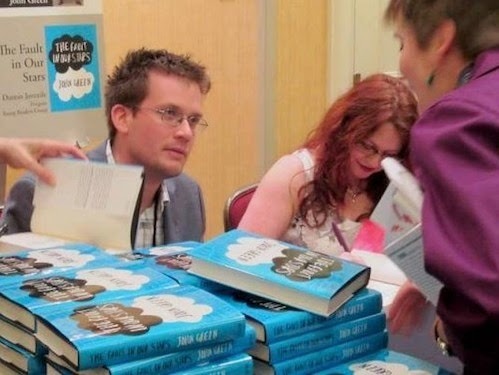 John Green at a book signing
John Green at a book signingIn February 2012 two novels were published. Both had teenaged heroines who were cancer patients. That's the ONLY thing the books had in common, however.
One book was John Green's The Fault in Our Stars, which has been on the New York Times best-seller list for 119 consecutive weeks (49 weeks as #1) and is being made into a much-anticipated movie.
The other is a modest fantasy allegory combining music and magic and talking birds. I had high hopes for Leandra's Enchanted Flute when it was accepted for publication by a new, enthusiastic fantasy publisher with the stated mission of providing great books for kids. They were professional with wonderful attention to detail. Unfortunately, they over-estimated how much readers were willing to pay for ebooks. After publishing several excellent titles they went out of business in March 2013, one month after the sequel to my book was published.
(I hadn't planned for this book to have a sequel, but my editor asked if I would write one so they could publish the two stories in one paperback, since the first story was not long enough to be cost effective in printed form.)
 My book's life was so short it didn't have a book signingTrue, TFiOS had the marketing savvy of a large New York publisher (as well as Green's clever and well-publicized promise to autograph every single copy of the first printing—all 150,000 books) but more than that, his book is what today's readers want: raw, gritty drama, romance, sex, and snark.
My book's life was so short it didn't have a book signingTrue, TFiOS had the marketing savvy of a large New York publisher (as well as Green's clever and well-publicized promise to autograph every single copy of the first printing—all 150,000 books) but more than that, his book is what today's readers want: raw, gritty drama, romance, sex, and snark.I certainly don't begrudge John Green's success! I'm very glad he's made many readers more aware of how cancer affects people, especially teens, and how desperately those of us who live with it want to find some kind of normalcy. Hopefully some will take the story to heart and not take their own lives for granted. We should all learn to live with more thankful hearts and count our blessings rather than focus on our losses.
I guess I was born 50 (or maybe 100) years too late to be a successful author, but I'll keep writing anyway because I love doing it, not because I expect to make any money at it. The hard-to-accept truth of the matter is that there are WAY more writers than readers these days, and because it's so easy to self-publish an ebook, there's a glut of poorly crafted (or just unedited) novels on the market. The many worthy books (i.e., carefully crafted and tightly edited) become lost in the jungle, and this may explain the recent statistic that over 85% of authors sell fewer than 250 copies of their books.
When I was a kid, I used to write stories for my friends to read. Now my new "targeted" audience is my granddaughters, so I'll make sure all my stories are worth reading.
Published on May 28, 2014 07:23
May 19, 2014
Processing the Grief Process
 Grief is a powerful response to any loss in our life--whether the death of a beloved family member or friend, the loss of a friendship through a move or betrayal, the loss of one's health, the voluntary or involuntary end of a satisfying career or meaningful activity, or even just a big change in life which makes us feel powerless.
Grief is a powerful response to any loss in our life--whether the death of a beloved family member or friend, the loss of a friendship through a move or betrayal, the loss of one's health, the voluntary or involuntary end of a satisfying career or meaningful activity, or even just a big change in life which makes us feel powerless.If we didn't love the person who has died or moved away or betrayed us, if we didn't find great meaning and satisfaction in the career or activity, it wouldn't hurt so badly to lose them. These permanent losses cause our hearts and psyches mental, emotional, and even physical pain. It's difficult to accept that what was once a vital part of our lives is now relegated to memory.
Worst of all, the pain gnaws away at what joy remains and makes the whole world seem utterly dark and without hope. This can lead to withdrawal from the world in fear that something or someone else will leave us and cause more pain.
How does a bereaved person learn to love and trust again? How does one break down a self-imposed protective wall to open the heart to love again, knowing that future pain is inevitable?
All I can tell you is what works for me. When I focus on what I've lost, I become very depressed. But when I focus on my current blessings, it enables me to move forward, one step at a time, giving thanks for this day of life and the possibilities ever before me. Enduring the pain of grief can make one more empathetic to what others are suffering. Reaching outside of self to give to others paradoxically frees the heart to love again and again.
Is there a risk when we give of ourselves? Of course! But an empty, guarded heart is a sad and lonely heart. The joy of loving others trumps all the pain in the world.
"For this is the message that you have heard from the beginning, that we should love one another." I John 3:11

Published on May 19, 2014 07:08
May 9, 2014
Fun Friday: Making the Fashion Police Frown
 Maybe it's because I was a kid in the sixties, or maybe being a straight-laced always-follow-the-rules German it was my form of rebellion, but ever since I was allowed to dress myself, I gave my mother headaches, saw lots of people shake their heads at me, and even got a braying sound from a boy in high school. Now my poor husband just sighs. The other day he even said, "The fashion police might have something to say about that" when I wore white tights with black shoes and my sort-of red and white dress.
Maybe it's because I was a kid in the sixties, or maybe being a straight-laced always-follow-the-rules German it was my form of rebellion, but ever since I was allowed to dress myself, I gave my mother headaches, saw lots of people shake their heads at me, and even got a braying sound from a boy in high school. Now my poor husband just sighs. The other day he even said, "The fashion police might have something to say about that" when I wore white tights with black shoes and my sort-of red and white dress.It began early, this desire to push the limits of wearable fun:
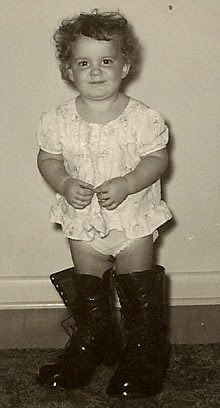 My mother, of course, made sure I was put together, at least in public:
My mother, of course, made sure I was put together, at least in public: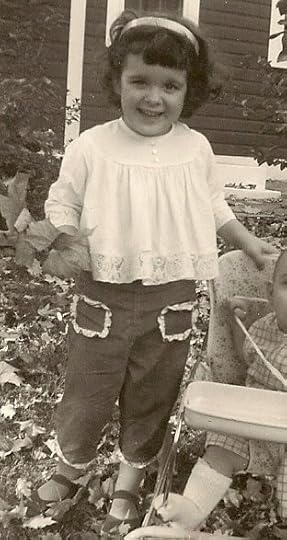 Once I started Kindergarten the next year, I wanted to "dress myself," and almost every day my mother sent me back to my room to wear something more appropriate. I didn't see the problem with wearing a red and white polka-dotted blouse with a green and yellow plaid skirt.
Once I started Kindergarten the next year, I wanted to "dress myself," and almost every day my mother sent me back to my room to wear something more appropriate. I didn't see the problem with wearing a red and white polka-dotted blouse with a green and yellow plaid skirt.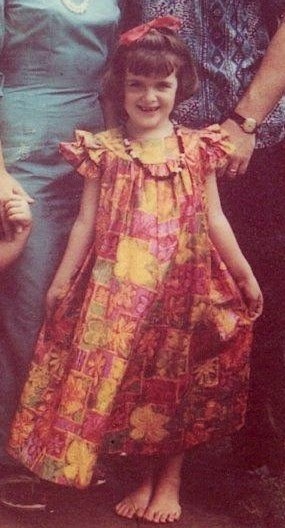 Living in Hawaii we often wore muumuus, which in my imagination were "princess dresses". That and my mother's full slips, which I'd take from her drawer and wear outside when my friends and I were playing dress up.
Living in Hawaii we often wore muumuus, which in my imagination were "princess dresses". That and my mother's full slips, which I'd take from her drawer and wear outside when my friends and I were playing dress up.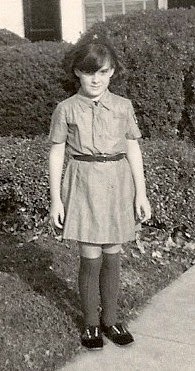 Even in uniform I had to dork it up with over-the-knee socks so my knees wouldn't get cold.
Even in uniform I had to dork it up with over-the-knee socks so my knees wouldn't get cold.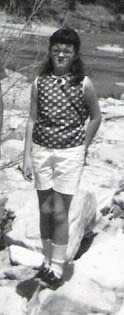 And thus continued a long tradition of dorky socks.
And thus continued a long tradition of dorky socks.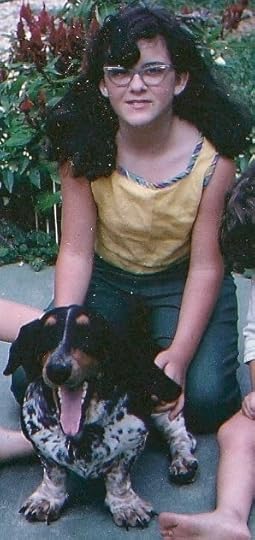 It didn't help that I was a totally awkward pre-teen.
It didn't help that I was a totally awkward pre-teen.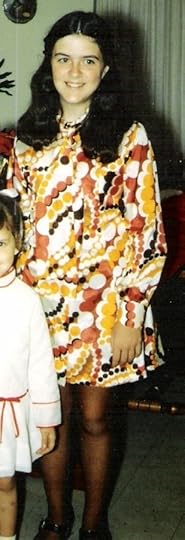 Even when I was dressing up for something, I managed to wear my own thing (my sisters both had white dresses that day). At least I didn't wear my lime green fishnet hose with this dress. Probably my mother had something to say about it....
Even when I was dressing up for something, I managed to wear my own thing (my sisters both had white dresses that day). At least I didn't wear my lime green fishnet hose with this dress. Probably my mother had something to say about it.... Once I got to high school I purposefully wore mismatched socks. I must have been desperate for attention. I remember one day in the cafeteria a boy dared me to stand on the table, roll up my pants, and show off my socks. Of course, I did....
Once I got to high school I purposefully wore mismatched socks. I must have been desperate for attention. I remember one day in the cafeteria a boy dared me to stand on the table, roll up my pants, and show off my socks. Of course, I did....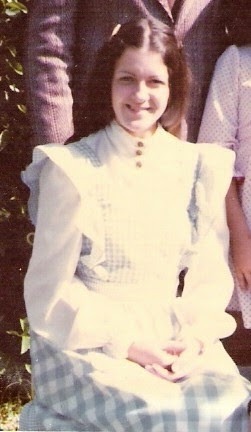 My senior year I made several long dresses and wore them all the time, even in my first year of college. The colors matched better (except for the socks underneath), but maybe I was missing my princess dresses.
My senior year I made several long dresses and wore them all the time, even in my first year of college. The colors matched better (except for the socks underneath), but maybe I was missing my princess dresses. I can definitely relate to "Ugly Betty" both with her mismatched outfits and awkwardness. I wish I could report that I have totally grown out of my insecurities, but I guess that'll be a lifelong struggle. Meanwhile I have a whole closet full of costumes, including--yes!--princess dresses. So if you like to play dress-up or want to come with me to a Renaissance festival, I probably have something you can wear....
I can definitely relate to "Ugly Betty" both with her mismatched outfits and awkwardness. I wish I could report that I have totally grown out of my insecurities, but I guess that'll be a lifelong struggle. Meanwhile I have a whole closet full of costumes, including--yes!--princess dresses. So if you like to play dress-up or want to come with me to a Renaissance festival, I probably have something you can wear....
Published on May 09, 2014 07:00
April 29, 2014
Weathering a Marital Depression
(It is difficult to write about such a painful time, but it occurred to me that sharing our story might help someone in a similar situation.)
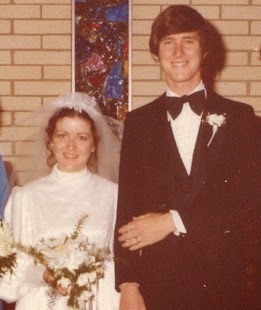 Our first wedding--two clueless kidsHow could our marriage have gone so wrong in just six years? Lack of money was a source of constant conflict. When our oldest son was born, he had colic and screamed for three months, and I must have had post-partum depression because I wasn't fit to live with. The hospital job seemed an answer to our prayers since it was a big career step for hubby and provided a good salary and benefits.
Our first wedding--two clueless kidsHow could our marriage have gone so wrong in just six years? Lack of money was a source of constant conflict. When our oldest son was born, he had colic and screamed for three months, and I must have had post-partum depression because I wasn't fit to live with. The hospital job seemed an answer to our prayers since it was a big career step for hubby and provided a good salary and benefits.
But in less than a year he was laid off in the worst possible way: He was made a scapegoat for a problem he'd tried for six months to remedy. It sent him into a deep, dark hole of depression. He quit going to church. He wasn't motivated to find a job. We spent all our meager savings. I tried to work, but our two-year-old son was feeling the effects of his parents' problems and was "kicked out" of three different daycares. I thought I was being supportive, but I had no idea how to help my husband. He didn't realize what he was saying, and didn't even recognize there was a huge problem. I was afraid I wouldn't be able to forgive him.
So I left him. I took our son and flew to another city to stay with friends. I had no intention of ending the relationship, but I realized it would take something drastic to fix it.
Within a few days my husband contacted a counselor and asked me to come back. I told him I would return to town, but I didn't think we should live together until we had made sufficient progress working out our problems. So he moved in with a friend, got a part-time job as a security guard with a hotel, and saw the counselor twice a week: once alone and once with me. Within a short time we were making great progress. We spent time together every day, really communicating, rebuilding our relationship. He returned to church, and we prayed together again.
After about three months we decided things had progressed enough that we could get back together, but we wanted to renew our marriage vows to make that commitment to God and one another.
 Six years later, a little older, a lot wiserI had lost so much weight from worry and stress that I was able to fit into my wedding dress again. A preacher friend "remarried" us in his living room with his wife and family as our only witnesses. They kept our son while we had a short second honeymoon to begin our new life together.
Six years later, a little older, a lot wiserI had lost so much weight from worry and stress that I was able to fit into my wedding dress again. A preacher friend "remarried" us in his living room with his wife and family as our only witnesses. They kept our son while we had a short second honeymoon to begin our new life together.
Twenty-nine years later we're so glad we didn't give up. By honoring our vows before God, we were able to weather that storm, and all the other ones since then to build a strong and happy marriage. And it truly has been "sweeter as the years go by."
 Last December--35th anniversary
Last December--35th anniversary
 Our first wedding--two clueless kidsHow could our marriage have gone so wrong in just six years? Lack of money was a source of constant conflict. When our oldest son was born, he had colic and screamed for three months, and I must have had post-partum depression because I wasn't fit to live with. The hospital job seemed an answer to our prayers since it was a big career step for hubby and provided a good salary and benefits.
Our first wedding--two clueless kidsHow could our marriage have gone so wrong in just six years? Lack of money was a source of constant conflict. When our oldest son was born, he had colic and screamed for three months, and I must have had post-partum depression because I wasn't fit to live with. The hospital job seemed an answer to our prayers since it was a big career step for hubby and provided a good salary and benefits.But in less than a year he was laid off in the worst possible way: He was made a scapegoat for a problem he'd tried for six months to remedy. It sent him into a deep, dark hole of depression. He quit going to church. He wasn't motivated to find a job. We spent all our meager savings. I tried to work, but our two-year-old son was feeling the effects of his parents' problems and was "kicked out" of three different daycares. I thought I was being supportive, but I had no idea how to help my husband. He didn't realize what he was saying, and didn't even recognize there was a huge problem. I was afraid I wouldn't be able to forgive him.
So I left him. I took our son and flew to another city to stay with friends. I had no intention of ending the relationship, but I realized it would take something drastic to fix it.
Within a few days my husband contacted a counselor and asked me to come back. I told him I would return to town, but I didn't think we should live together until we had made sufficient progress working out our problems. So he moved in with a friend, got a part-time job as a security guard with a hotel, and saw the counselor twice a week: once alone and once with me. Within a short time we were making great progress. We spent time together every day, really communicating, rebuilding our relationship. He returned to church, and we prayed together again.
After about three months we decided things had progressed enough that we could get back together, but we wanted to renew our marriage vows to make that commitment to God and one another.
 Six years later, a little older, a lot wiserI had lost so much weight from worry and stress that I was able to fit into my wedding dress again. A preacher friend "remarried" us in his living room with his wife and family as our only witnesses. They kept our son while we had a short second honeymoon to begin our new life together.
Six years later, a little older, a lot wiserI had lost so much weight from worry and stress that I was able to fit into my wedding dress again. A preacher friend "remarried" us in his living room with his wife and family as our only witnesses. They kept our son while we had a short second honeymoon to begin our new life together.Twenty-nine years later we're so glad we didn't give up. By honoring our vows before God, we were able to weather that storm, and all the other ones since then to build a strong and happy marriage. And it truly has been "sweeter as the years go by."
 Last December--35th anniversary
Last December--35th anniversary
Published on April 29, 2014 06:51
April 24, 2014
Einstein was right
 Ancient bristlecone pineThe older I get, the faster time flies. But does time really "fly" or is it just our perception of it?
Ancient bristlecone pineThe older I get, the faster time flies. But does time really "fly" or is it just our perception of it?When we are children, waiting for a birthday or Christmas or other anticipated event takes FOREVER. Each day drags on, and a whole month seems like an impossible distance across the abyss.
Now a month passes between blinks, and birthdays come much faster than I can mentally process them.
I've figured out why. When we're children, each year is a bigger percentage of our entire life, but as we add years, each one becomes a smaller and smaller percentage and so seems to pass more quickly.
The oldest living thing is the bristlecone pine pictured above, which by its rings is over 5,000 years old. That venerable tree has seen quite a lot of history come and go.
In contrast the mayfly in its adult form lives less than 24 hours. Its only purpose is to reproduce. But if you could ask a mayfly if it felt cheated compared with the bristlecone pine, I doubt that it would care. From its perspective a successful life means completion of its purpose.
 A mayfly in all its brief gloryWhen I was in my thirties I started noticing how many "famous" people in history died in their thirties: Alexander the Great, Mozart, George Gershwin, Lou Gehrig, Martin Luther King, Florence Griffith Joyner, most of the astronauts of Apollo 1, Challenger, and Columbia, and many, many others. I started researching to write a collective biography entitled "Thirty-Something" but couldn't find an interested publisher. I did publish Christa McAuliffe's entry as an article with the magazine Cricket, at least (she was the teacher astronaut who died in the Challenger explosion).
A mayfly in all its brief gloryWhen I was in my thirties I started noticing how many "famous" people in history died in their thirties: Alexander the Great, Mozart, George Gershwin, Lou Gehrig, Martin Luther King, Florence Griffith Joyner, most of the astronauts of Apollo 1, Challenger, and Columbia, and many, many others. I started researching to write a collective biography entitled "Thirty-Something" but couldn't find an interested publisher. I did publish Christa McAuliffe's entry as an article with the magazine Cricket, at least (she was the teacher astronaut who died in the Challenger explosion).Even though they didn't live their full "threescore and ten" these people managed to accomplish a lot in their short lives. The number of years is not what's important. As Gandalf says in J. R. R. Tolkien's Lord of the Rings, "All we have to decide is what to do with the time that is given us."
Or as Paul wrote about 2,000 years ago, "Look carefully then how you walk, not as unwise but as wise, making the best use of the time, because the days are evil." (Ephesians 5:15-16)
Time is our most valuable commodity. Einstein was right--it is relative, and relatively speaking, shouldn't we make the most of what time we have remaining?

Published on April 24, 2014 08:57
April 21, 2014
The Cost of Ignorance

It has been said that "ignorance is bliss." There sure are a lot of blissfully ignorant people in this country.
Sometimes I envy them. Often I wish I didn't know what I know.
But because I choose to be a truthseeker, I turn over many rocks that expose ugly crawly things living in dark places.
Who is behind all the evil in the world? Satan, the father of lies. He is real, and even though he has already been defeated by the sacrifice and resurrection of Jesus Christ, his mission is to take down as many of us as he can to join him in eternal torment. (Hell, BTW, was prepared for the devil and his angels--Matthew 25:41.)
Why is ignorance a bad thing? If we're "ignorant of Satan's devices" he will get an advantage over us (II Corinthians 2:11). A person does not sleep alone outside in the area where a man-eating lion has been known to hunt. A prudent person is watchful, on guard. And that takes knowledge. "Be sober, be vigilant, because your adversary the devil, as a roaring lion, walks about, seeking whom he may devour." I Peter 5:8
Some people serve Satan willingly; others serve him and don't even know it. We must judge each person's words and actions by the yardstick of truth and not let smooth words deceive us: "Satan changes himself into an angel of light. Therefore it is no great thing if his ministers also be transformed as the ministers of righteousness...." II Corinthians 11:14-15
Jesus said, "Behold, I send you forth as sheep in the midst of wolves. Be ye therefore wise as serpents, and harmless as doves." Matthew 10:16
We can't remain ignorant and be wise to the way of the devouring wolf or lion.
"In the world you shall have tribulation, but be of good cheer; I have overcome the world." John 16:33

Published on April 21, 2014 07:13



